Negotiating Norms: The Right to Free, Prior, and Informed Consent in Liberia and Beyond: Interdisciplinary Studies in Human Rights, cartea 9
Autor Ricarda Röschen Limba Engleză Hardback – 13 dec 2023
From a legal anthropological perspective, it attempts to disentangle the various coexisting understandings of FPIC and provide an explanation for the multiplicity of FPIC norms or – to put it in other words – its fragmentation. It examines the right- or stakeholders of FPIC, the scope of the consent requirement, the respect for self-determined decision-making, and the right to FPIC of women in different sociolegal fields. Moreover, it explores the impact of power relations, strategic alliances, and discourses within these fields and shows that the emerging FPIC norms are the result of norm negotiation processes.
The fields that are examined include transnational law – more specifically, human rights, environmental, and development law -, the Liberian post-conflict forest and land legislation, and Liberian community forests as fields in which FPIC is operationalized. Liberia is quite unique in this respect. It is not only one of the few countries in Africa recognizing FPIC but has also begun implementing it. The book shows that based on the logic of a sociolegal field, legal identities are discursively created and determine the meaning of FPIC. Moreover, different actors can resort to different legalities shaping the emerging FPIC norm.
Preț: 792.51 lei
Preț vechi: 966.47 lei
-18% Nou
Puncte Express: 1189
Preț estimativ în valută:
151.67€ • 157.76$ • 125.21£
151.67€ • 157.76$ • 125.21£
Carte tipărită la comandă
Livrare economică 15-29 aprilie
Preluare comenzi: 021 569.72.76
Specificații
ISBN-13: 9783031459092
ISBN-10: 3031459091
Pagini: 392
Ilustrații: XII, 392 p. 5 illus.
Dimensiuni: 155 x 235 mm
Greutate: 0.74 kg
Ediția:1st ed. 2023
Editura: Springer Nature Switzerland
Colecția Springer
Seria Interdisciplinary Studies in Human Rights
Locul publicării:Cham, Switzerland
ISBN-10: 3031459091
Pagini: 392
Ilustrații: XII, 392 p. 5 illus.
Dimensiuni: 155 x 235 mm
Greutate: 0.74 kg
Ediția:1st ed. 2023
Editura: Springer Nature Switzerland
Colecția Springer
Seria Interdisciplinary Studies in Human Rights
Locul publicării:Cham, Switzerland
Cuprins
1. Introduction.- 2. The Global Time-Space: FPIC in the Fields of Transnational Law.- 3. The National Time-Space: FPIC in Liberian Fields of Post-Conflict Law-Making.- 4. The Local Time-Space: FPIC in the Fields of Community Forestry.- 5. Conclusion: FPIC's Journeys.
Notă biografică
Ricarda Rösch is a senior policy advisor at the Federal Ministry for Economic Cooperation and Development. From 2009 to 2014, she studied European, Comparative, and International Law in Bremen, Montpellier, and London. Subsequently, she joined the DFG-funded project "Human Rights as Standards for Transnational Economic Law" at the Friedrich-Alexander-University Erlangen-Nürnberg. With funding from the Heinrich-Böll-Stiftung, she completed her Ph.D. in 2022. Moreover, she worked as a visiting researcher at the Kofi Annan Institute for Conflict Transformation, as a consultant in the land sector (both in Liberia), and as a sustainability analyst for a sustainable bank.
Textul de pe ultima copertă
The book explores the right to free, prior and informed consent (FPIC) – a highly controversial right. It is mainly discussed in the context of large-scale business projects on Indigenous territories but also with respect to the creation of protected areas and communities’ traditional resource rights.
From a legal anthropological perspective, it attempts to disentangle the various coexisting understandings of FPIC and provide an explanation for the multiplicity of FPIC norms or – to put it in other words – its fragmentation. It examines the right- or stakeholders of FPIC, the scope of the consent requirement, the respect for self-determined decision-making, and the right to FPIC of women in different sociolegal fields. Moreover, it explores the impact of power relations, strategic alliances, and discourses within these fields and shows that the emerging FPIC norms are the result of norm negotiation processes.
The fields that are examined include transnational law – more specifically, human rights, environmental, and development law -, the Liberian post-conflict forest and land legislation, and Liberian community forests as fields in which FPIC is operationalized. Liberia is quite unique in this respect. It is not only one of the few countries in Africa recognizing FPIC but has also begun implementing it. The book shows that based on the logic of a sociolegal field, legal identities are discursively created and determine the meaning of FPIC. Moreover, different actors can resort to different legalities shaping the emerging FPIC norm.
From a legal anthropological perspective, it attempts to disentangle the various coexisting understandings of FPIC and provide an explanation for the multiplicity of FPIC norms or – to put it in other words – its fragmentation. It examines the right- or stakeholders of FPIC, the scope of the consent requirement, the respect for self-determined decision-making, and the right to FPIC of women in different sociolegal fields. Moreover, it explores the impact of power relations, strategic alliances, and discourses within these fields and shows that the emerging FPIC norms are the result of norm negotiation processes.
The fields that are examined include transnational law – more specifically, human rights, environmental, and development law -, the Liberian post-conflict forest and land legislation, and Liberian community forests as fields in which FPIC is operationalized. Liberia is quite unique in this respect. It is not only one of the few countries in Africa recognizing FPIC but has also begun implementing it. The book shows that based on the logic of a sociolegal field, legal identities are discursively created and determine the meaning of FPIC. Moreover, different actors can resort to different legalities shaping the emerging FPIC norm.
Caracteristici
Provides insights into the negotiation of human rights Combines human rights and qualitative research Examines the operationalization of Indigenous consultation rights












